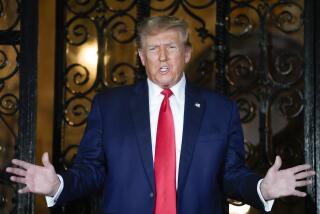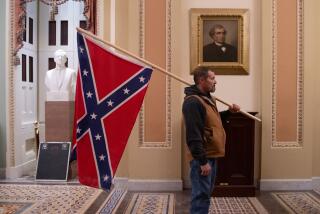From Korea to Cohen, Trump had a very bad week. But don’t expect a sudden drop in his poll numbers
A failed summit with North Korean leader Kim Jong Un, coupled with blistering testimony by his former lawyer and fixer Michael Cohen, added up to a miserable week for President Trump.
What they don’t add up to is the kind of silver bullet that many Democratic voters keep wishing for — a single blow that would cause Trump’s support to suddenly collapse.
Indeed, a defining characteristic of Trump’s public standing has been stability: Trump entered office as a historically unpopular president and has remained unpopular, but the support he does have has remained tenacious.
History suggests that shouldn’t surprise us.
Sign up for the Essential Politics newsletter »
THE NIXON PRECEDENT
The Watergate break-in took place on June 17, 1972. Despite extensive reporting in the Washington Post and elsewhere about links between the burglars and White House aides, President Nixon won reelection in a landslide that November. The five burglars and two accomplices went on trial in January 1973, leading to five guilty pleas and two convictions.
Even after the convictions and extensive press coverage of the widening scandal, Nixon’s public approval remained solid, says professor Charles Franklin of Marquette University in Milwaukee, who directs the school’s widely respected polling operations and has extensively studied the survey data on Nixon.
Only after two weeks of highly charged testimony on live TV before the Senate Watergate committee in May 1973 did Nixon’s standing begin to drop. Even then, it declined only to about where Trump has sat for most of the past year — approval in the low 40% range.
Franklin’s research highlights another key aspect of Nixon’s standing: After that initial decline, his approval ratings stayed fairly stable. Dramatic events, including the firing of special prosecutor Archibald Cox and the resignation of Atty. Gen. Elliot Richardson — the so-called Saturday Night Massacre — in October 1973 did not cause significant change.
Only at the very end, with the release of the “smoking gun” White House tape on Aug. 5, 1974, did support for Nixon plummet below 30% in some polls. He resigned on Aug. 8, after congressional Republican leaders went to the White House to tell him that he faced all-but certain removal from office.
The lesson from that history is that public opinion about presidents generally doesn’t shift suddenly, Franklin says.
In part, that stability results from the fact that the people who pay the most attention to news and public affairs tend to have the most deeply entrenched views. And that’s likely to be even more true now than in the 1970s because of the hyper-polarization that marks our political era.
THE COHEN TESTIMONY
Trump’s former lawyer painted a darkly negative picture of his former boss, calling him a “racist” and a “con man” and describing a culture of criminality surrounding him, as Chris Megerian, Del Quentin Wilber and Jennifer Haberkorn wrote.
In his testimony to the House Oversight Committee, Cohen cleared up a number of major questions about his role in matters such as negotiations to build a Trump Tower in Moscow.
This was the opening shot in what’s likely to be a yearlong series of public hearings delving into possible corruption and conflicts of interest surrounding Trump. As Megerian wrote, Cohen dropped a trail of bread crumbs for Democrats to follow in delving further into the business dealings of Trump and the people around him.
Rep. Alexandria Ocasio-Cortez (D-N.Y.) was particularly effective in using her question time to prompt Cohen to name other current and former Trump associates who could shed light on the topics under investigation. After the hearing, the committee chairman, Rep. Elijah Cummings (D-Md.), made clear that many of those named likely will soon be summoned to testify.
If you missed the hearing, you can catch up on all the highlights with our summary of the live coverage.
LITTLE REPUBLICAN DEFENSE
During the public hearing, Republicans hammered away at Cohen’s credibility, as Haberkorn wrote. What they notably did not do was make much effort to defend Trump’s character.
One Republican member of the committee, Rep. Mark Meadows of North Carolina, did try to rebut the charge of racism, summoning a longtime Trump family retainer, Lynne Patton, who is black, to stand behind him in mute testimony as he insisted that Trump wasn’t racist.
Other than that, however, the Republicans said little to directly rebut Cohen’s accusations.
BOMBING IN HANOI
Trump, in Vietnam to meet with North Korea’s Kim, told reporters that he had stayed awake to watch at least part of Cohen’s testimony despite the 12-hour time difference, and he complained bitterly about the hearing taking place during what he had hoped would be a diplomatic triumph.
Just a week ago, Trump was bragging that he should be getting the Nobel Peace Prize for his efforts. That ceremony will have to wait.
The two sides disagree about what, exactly, happened and who’s to blame for the summit’s abrupt end and lack of agreement. As Trump said in an interview with Sean Hannity on Fox News, “I just don’t think maybe either of us were ready.”
That, of course, is exactly what critics have said for months — that Trump’s approach of not working out agreements at a lower level, and, instead, trying to conduct high-level negotiations personally, almost guaranteed failure.
As Noah Bierman wrote, Trump’s “I alone can fix it” approach has now backfired both internationally and domestically. Some of the same problems that afflicted his summitry — especially his refusal to allow others to negotiate for him — also contributed to his defeat in the government shutdown fight in December and January.
Those same problems also have complicated the administration’s trade negotiations with China, in which Trump increasingly appears to be at odds with his top trade official, Robert Lighthizer, as Don Lee wrote.
Advocates for a tough stand toward China worry that Trump, increasingly anxious to have a deal to tout after coming up empty with Kim, will give up too much when he meets with Chinese leader Xi Jinping. That meeting likely will take place at Mar-a-Lago later this month, Trump said Sunday when he announced he was extending his deadline for imposing new tariffs on China.
Other major elements of Trump’s foreign policy, such as his effort to forge a peace agreement in the Mideast, don’t appear to be making much progress, either, Tracy Wilkinson wrote.
BULLDOZERS IDLE AT THE BORDER
The House passed a resolution Tuesday overturning Trump’s emergency declaration to divert funds to build a border wall. As Sarah Wire wrote, the House action was a foregone conclusion given the Democratic majority in the chamber. The real question is whether the Senate will follow suit.
So far, three Republican senators have said they’ll vote to overturn the emergency order. Assuming all the Democrats stick together, they’d need one more GOP vote for the resolution to pass. On Thursday, Sen. Lamar Alexander of Tennessee warned Trump to reconsider his order, strongly suggesting he might provide the needed fourth vote when the matter comes to the Senate floor later this month.
Of course, Trump has said he’ll veto the resolution if it passes, and there’s little prospect of Congress overturning a veto. But having to cast his first veto would be a defeat for Trump.
As David Cloud and Molly O’Toole wrote, Patrick Shanahan, the acting secretary of Defense, plans to issue the formal certification soon that would allow military money to be used for border fencing. The issue has put Shanahan in a tough spot, since he wants Trump to nominate him for the top Pentagon job, but he also doesn’t want to alienate senators who would have to vote to confirm him.
Meanwhile, however, as O’Toole and Molly Hennessey-Fiske reported, all the rhetoric in Washington stands in sharp contrast to the picture on the ground in Texas, where legal confusion over Trump’s emergency has stalled any new construction.
“We’re just waiting to hear” from Washington, the head of the Border Patrol’s “wall team” in the Rio Grande Valley said. “There’s nothing going on right now.”
THE DEMOCRATIC FIELD KEEPS GROWING
Jay Inslee is betting he can ride climate change to the White House, Evan Halper wrote. Inslee, the governor of Washington, formally joined the presidential race on Friday.
Joe Biden, meantime, inched closer to a launch announcement, saying during an interview in Delaware that his family supported the idea of his running, Janet Hook reported.
Several more candidates, including former Rep. Beto O’Rourke of Texas, Sen. Sherrod Brown of Ohio and former Gov. John Hickenlooper of Colorado, are expected to make announcements this month.
Facing that big field, a lot of Democrats ask: Who is most electable over Trump? But as Hook wrote, “electability” means different things to different voters.
This weekend marks the start of the one-year countdown to the California primary on March 3, 2020. Mark Barabak looked at Kamala Harris and Ronald Reagan — bookend symbols of the changing nature of the Golden State and its politics.
Haberkorn looked at how Senate Majority Leader Mitch McConnell uses his control of the chamber’s agenda to put pressure on the potential Democratic candidates.
And Doyle McManus examined Trump’s Republican challengers: They’re in it, but maybe not to win it, he wrote.
A CROSS TO BEAR
The Supreme Court this week dived back into an issue that has divided the justices — and confused lower courts — for years: What sort of religious symbols does the 1st Amendment allow on public property?
The symbol at issue this time, David Savage wrote, is a large cross erected as a war memorial years ago in Maryland. At oral arguments, a clear majority of the justices seemed ready to allow the “Peace Cross” to stand. They remained divided on whether to issue a broad ruling that might allow many more religious symbols to be erected in the future.
LOGISTICS
That wraps up this week. Until next time, keep track of all the developments in national politics and the Trump administration at our Politics page and on Twitter @latimespolitics.
Send your comments, suggestions and news tips to politics@latimes.com.
If you like this newsletter, tell your friends to sign up.
More to Read
Get the L.A. Times Politics newsletter
Deeply reported insights into legislation, politics and policy from Sacramento, Washington and beyond. In your inbox three times per week.
You may occasionally receive promotional content from the Los Angeles Times.







